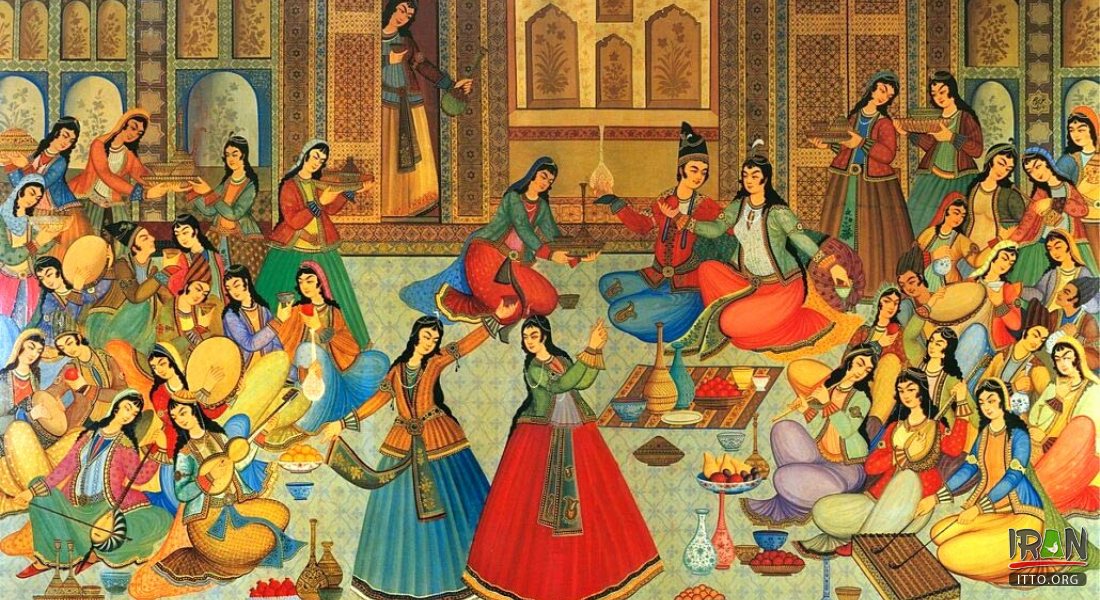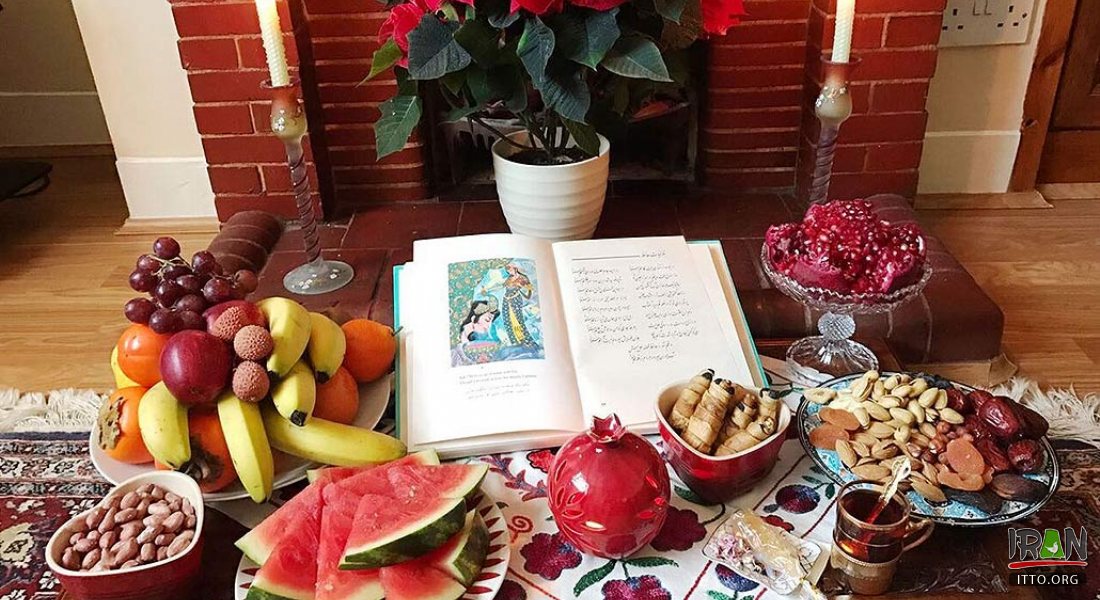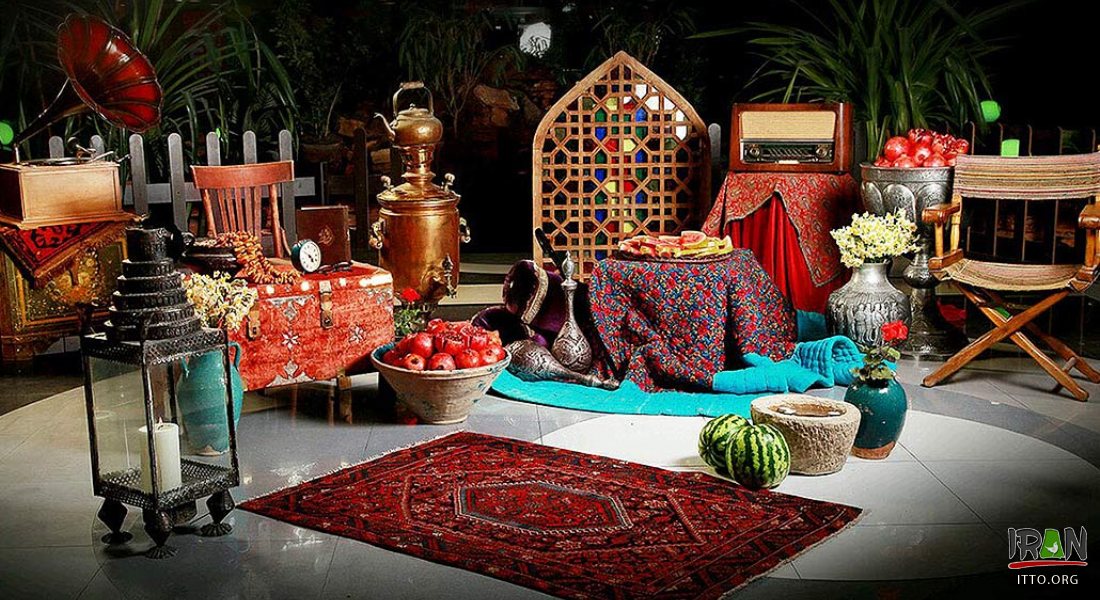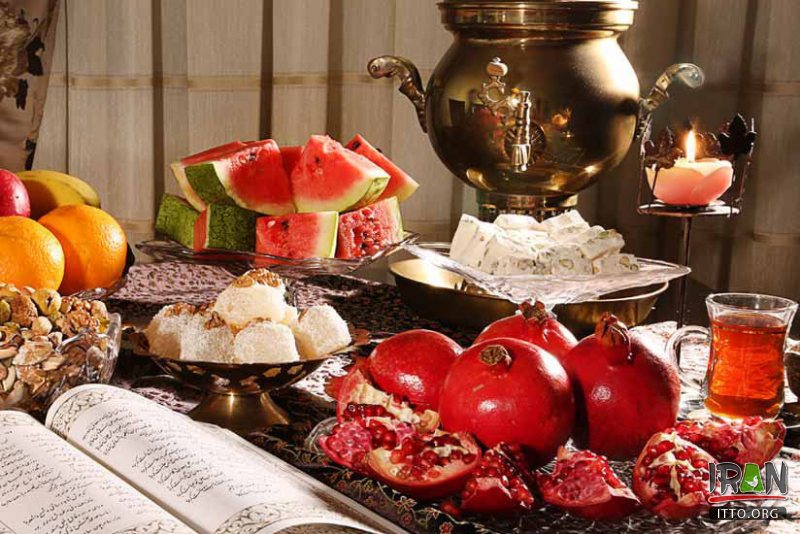Shab-e-Yalda or Shab-e Chelleh (Yalda Night) is one of the most ancient Persian festivals annually celebrated on December 21 by Iranians all around the world. This is one of the most celebrated traditional events in Iran which marks the longest night of the year, that is, in the night of the Northern Hemisphere's winter solstice.
The longest and darkest night of the year is a time when friends and family gather together to eat, drink and read poetry (especially Hafez) until well after midnight. Fruits and nuts are eaten and pomegranates and watermelons are particularly significant. The red color in these fruits symbolizes the crimson hues of dawn and glow of life. The poems of Divan-e Hafez, which can be found in the bookcases of most Iranian families, are read or recited on various occasions such as this festival and Nowruz. Shab-e Yalda was officially added to Iran's List of National Treasures in a special ceremony in 2008.

Yalda Night is an ancient Persian festival annually celebrated by Iranians
Yalda Night (Shab-e Chelleh) is Persian winter event which is commemorated on or around December 20 or 21 each year. These days many Iranians are out making their purchases of fruits such as pomegranates, watermelons and various dried nuts. Today, Yalda celebrations have become a social occasion when friends and family gather to eat, drink and read poetry (especially Hafiz) until after midnight. Each member of the family makes a wish and randomly opens Hafez’s book of poems and recites the poem, which is believed to be an interpretation to the wish. Fruits, particularly pomegranates and watermelons, and nuts are served in this night. The fruits signify the hope for having a fruitful spring and summer.
The red-colored fruits are believed to symbolize the crimson hues of dawn and glow of life, invoking the glory of Mithra. Pomegranates with angelica powder are also believed to protect individuals against the Devil.
In ancient Iran, once lived a goddess named Mithra. She was the goddess of light and brought warmth to lives. Yalda night celebration is believed to be a dedication to her, who brings light back into the people’s lives. To live a minute of brightness more each day is a privilege ancient Iranians valued and is celebrated through centuries.

This ancient festival goes back to the ancient time when many Persians believed in Zoroastrian religion.
Central Asian countries such as Afghanistan, Tajikistan, Uzbekistan, Turkmenistan and some Caucasian states like Azerbaijan and Armenia share the same tradition as well and celebrate Yalda Night annually at this time of the year. Yalda Night was officially added to Iran’s List of National Treasures during a special ceremony in 2008. The annual winter ceremony manifests the traditional concept of light and good prevailing over darkness and evil in the ancient Iranian religion.
The longest and darkest night of the year marks "the night opening the initial forty-day period of the three-month winter", from which the name Chelleh "fortieth" derives. There are all together three 40-day periods, one in summer, and two in winter. The two winter periods are known as the "great Chelleh" period (1 Day to 11 Bahman, 40 full days), followed/overlapped by the "small Chelleh" period (10 Bahman to 30 Bahman, 20 days + 20 nights = 40 nights and days). Shab-e Chelleh is the night opening the "big Chelleh" period, that is the night between the last day of autumn and the first day of winter.

Yalda Night, both before and after Islam, has a special place in Iranian culture and has always been considered a motivation for gathering close and distant relatives.
The other name of the festival, 'Yaldā', is ultimately a borrowing from Syriac-speaking Christians. In the 1st–3rd centuries, significant numbers of Eastern Christians settled in Arsacid and Sassanid territories, where they had received protection from religious persecution. Through them, Western Iranians (i.e. Parthians, Persians etc.) came in contact with Christian religious observances, including, it seems, Nestorian Christian Yalda, which in Syriac (a Middle Aramaic dialect) literally means "birth" but in a religious context was also the Syriac Christian proper name for Christmas, and which—because it fell nine months after Annunciation—was celebrated on eve of the winter solstice.
The Christian festival's name passed to the non-Christian neighbors and although it is not clear when and where the Syriac term was borrowed into Persian, gradually 'Shab-e Yalda' and 'Shab-e Chelleh' became synonymous and the two are used interchangeably. The word yalda, cognate with the Arabic Yelda meaning 'dark night' might be related to the Old Norse 'jól'/Old English 'geōl' (yole - yule).






